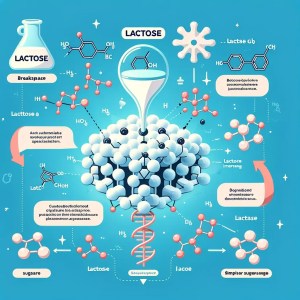- Introduction to Lactose Intolerance in Adulthood
- The Essence of Lactose and Its Digestive Demands
- The Age Factor in Lactose Intolerance
- Beyond Genetics: Other Contributors to Lactose Intolerance
- Managing Lactose Intolerance: Practical Strategies
- When to Seek Medical Advice
- Frequently Asked Questions About Lactose Intolerance
- Final Thoughts
- We Want to Hear from You!
Introduction to Lactose Intolerance in Adulthood
As we journey through life, our bodies undergo a myriad of changes, and our relationship with food is no exception. Among these changes, a noticeable shift often occurs in how we process dairy products. What was once a delightful indulgence in cheese, ice cream, and other dairy delights, can transform into a source of discomfort and digestive upset. But why does this change happen, and more importantly, how can we adapt to it?

A Family’s Encounter with Lactose Intolerance
My Wife’s Journey with Lactose Intolerance
In our family, lactose intolerance is a familiar challenge. My wife, Jessica, who previously relished dairy without issue, found herself increasingly susceptible to lactose intolerance as she aged. This gradual shift in her body’s response to dairy is reflective of the natural decrease in lactase production over time.
My Son’s Lifelong Sensitivity
Contrastingly, my oldest son has always been sensitive to lactose. His experience underscores that lactose intolerance can be present from early life, likely influenced by genetic factors.
The Essence of Lactose and Its Digestive Demands
At the heart of this dairy dilemma lies lactose – the natural sugar prevalent in dairy products. Our body’s ability to break down lactose hinges on the presence of lactase, a critical digestive enzyme. Lactase’s role is to simplify lactose into glucose and galactose, sugars that are then absorbed into the bloodstream as essential nutrients.
However, when lactose isn’t adequately broken down, it journeys to the colon and undergoes fermentation, leading to a spectrum of unpleasant symptoms such as abdominal discomfort, bloating, gas, diarrhea, and an urgent need for bowel movement.
A staggering 75% of the global population experiences a decline in their ability to digest lactose as they age. To understand this phenomenon, we must delve deeper into the causes and strategies to manage it.

The Age Factor in Lactose Intolerance
The Evolutionary Perspective
Originally, the production of lactase is at its peak during infancy, catering to the lactose in breastmilk. According to Dr. Linna Goelz of Sonoran University of Health Science, as humans transitioned from breastfeeding to solid foods historically, the consumption of lactose-rich foods diminished. Consequently, our bodies adapted by reducing lactase enzyme production over time, a process known as lactase non-persistence or acquired lactase deficiency.
Dr. Janese Laster, a gastroenterologist and founder of Gut Theory Total Digestive Care, highlights that this reduction in lactase is a natural progression for most humans post-infancy.
The Genetic Connection
Your genetic makeup plays a pivotal role in how you process dairy products in adulthood. Dr. Laster emphasizes that the persistence of lactase activity is largely influenced by inherited gene variants. Some individuals, despite reduced lactase production, can still tolerate certain dairy products like cheese or yogurt, thanks to the fermentation process which reduces lactose content.
Dr. Menka Gupta of Nutra Nourish points out that certain ethnic groups, such as Southeast Asian, East Asian, West African, Native American, and Hispanic populations, are more prone to lactose intolerance due to genetic predispositions.
Recent Advances in Understanding the Genetics of Lactose Intolerance
Recent studies have shed more light on the genetic mechanisms behind lactose intolerance. Researchers have identified specific regions in the genome, such as the LCT and MCM6 loci, which play crucial roles in lactase production. These genetic insights help explain the variations in lactose tolerance among different populations and could pave the way for more personalized dietary recommendations for those with lactose intolerance.
Interactive Global Insights on Lactase Persistence
To further understand the global prevalence of lactose intolerance, interactive maps have been developed, illustrating lactase persistence (LP) frequencies worldwide. These resources compile extensive data on LP, offering insights into geographical and ethnic variations in lactase persistence. Such tools are invaluable for researchers and healthcare providers in understanding the distribution of lactose intolerance globally and tailoring health advice accordingly.

Beyond Genetics: Other Contributors to Lactose Intolerance
The complexity of our digestive system means that there are other factors at play. Gastrointestinal illnesses, injuries to the small intestine, surgeries, and conditions like Crohn’s disease can all precipitate lactose intolerance. These conditions often result in damage to the intestinal mucosa, commonly referred to as leaky gut, impacting lactase production and, consequently, lactose tolerance.
Managing Lactose Intolerance: Practical Strategies
While reversing the natural decline in lactase production is not feasible, managing lactose intolerance is certainly achievable. Our experts suggest several approaches:
- Identify and Eliminate Troublesome Dairy Products: Pinpoint which dairy items trigger the worst reactions and exclude them from your diet. Often, hard cheeses, butter, and ghee are more tolerable due to their lower lactose content.
- Moderation is Key: Limit the amount of lactose consumed in one sitting to minimize symptoms.
- Embrace Fermented Dairy: Incorporate probiotic-rich dairy products like yogurt and kefir into your diet, as these can aid in lactose breakdown.
- Avoid Aggravating Foods: Steer clear of other foods that you’re sensitive to, as these can exacerbate lactose intolerance symptoms.
- Explore Plant-Based Alternatives: Experiment with non-dairy, plant-based substitutes.
- Probiotic Support: Utilize probiotics, especially those containing Bifidobacterium, Saccharomyces, and Lactobacillus strains, to enhance gut health.
- Lactase Supplements: Consider taking lactase supplements before consuming dairy to mitigate discomfort.
Dr. Laster notes that while adjustments in the microbiome may improve tolerance to fermented dairy, significant changes in gene expression to boost lactase activity to childhood levels are improbable.
When to Seek Medical Advice
Always consult with a healthcare professional before starting any new supplements or if you have concerns about increasing lactose intolerance. Determining the underlying cause of lactose intolerance is crucial for effective management, as Dr. Gupta suggests.

Frequently Asked Questions About Lactose Intolerance
- What are the symptoms of lactose intolerance?
- Common symptoms include abdominal pain, bloating, flatulence, and diarrhea after consuming dairy products.
- Is lactose intolerance the same for everyone?
- No, it varies individually. People can tolerate different amounts of lactose, and there are dairy options with varying lactose levels, including lactose-free products.
- What is lactose?
- Lactose is a natural sugar found in milk and dairy products. The body uses the enzyme lactase to digest lactose.
- Why do I have lactose intolerance?
- The ability to digest lactose as an adult is a genetic trait, with individuals often tolerating varying amounts of lactose with no or minor symptoms.
- How can I differentiate between a milk allergy and lactose intolerance?
- A doctor can diagnose whether discomfort after eating dairy is from lactose intolerance or a milk allergy.
- What is lactose-free milk?
- Lactose-free milk is real cow’s milk with the lactose either filtered out or broken down into its two simple sugars.
- Is lactose intolerance genetic?
- Yes, in one sense, it’s caused by our genes, although individuals can minimize symptoms with dietary adjustments.
- Should I avoid dairy during pregnancy if I’m lactose intolerant?
- No, if you already tolerate some lactose in your diet, you should not stop eating dairy foods. Instead, slowly increase the amount and variety of dairy foods to recommended amounts.
- Will consuming dairy while nursing make my baby lactose intolerant?
- No, drinking milk or eating cheese or yogurt will not make your baby lactose intolerant, as it is a genetic issue.
- Can children with lactose intolerance still consume dairy products?
- Yes, a diagnosis of lactose intolerance in children does not necessarily mean they must eliminate milk, cheese, and yogurt from their diet.
- What are the types of lactose intolerance?
- Lactose intolerance can be primary, secondary, or congenital. Primary lactase deficiency is most common and typically develops as people age. Secondary lactase deficiency can result from injuries to the small intestine or certain intestinal diseases like celiac disease or Crohn’s. Congenital lactase deficiency, a rare condition, occurs when infants are born without the ability to produce lactase.
- Is lactose intolerance genetically inherited?
- Yes, certain types of lactose intolerance are genetically inherited. Primary lactase deficiency involves a genetic mutation passed from parents to children. Congenital lactase deficiency is also inherited and requires both parents to carry the mutated gene.
- Can lactose intolerance come and go?
- Lactose intolerance is usually a permanent condition. While symptoms might vary in intensity, the underlying lactase deficiency doesn’t go away.
- What are some common lactose intolerance treatments and dietary alternatives?
- People with lactose intolerance often avoid dairy products or choose low-lactose options like hard cheeses. Lactose-free dairy products and over-the-counter lactase enzyme supplements can also help. It’s important to maintain a balanced diet with alternative calcium sources.
- How is calcium intake managed in a lactose-free diet?
- Non-dairy sources of calcium include sesame seeds, chia seeds, almonds, sardines, soybeans, and various vegetables. Vitamin D, important for calcium absorption, can be obtained from sunlight, supplements, and certain foods like fatty fish and UV-grown mushrooms.
Final Thoughts
Understanding the evolution of our body’s response to dairy as we age is key to managing lactose intolerance. By acknowledging the genetic and environmental factors at play, and adopting practical dietary strategies, one can navigate this common condition with
greater ease and comfort. Remember, adapting our diet to our body’s changing needs is not just about alleviating symptoms; it’s about embracing a lifestyle that harmonizes with our well-being at every stage of life.
Resources
- Genetics of Lactose Intolerance: An Updated Review and Online Interactive World Maps of Phenotype and Genotype Frequencies – A comprehensive review from PubMed, providing in-depth information on the genetic basis of lactose intolerance. PubMed
- Interactive Global Insights on Lactase Persistence – This resource offers interactive maps illustrating lactase persistence frequencies worldwide, highlighting the geographical and ethnic variations in lactase persistence. University of California, Santa Cruz Genome Browser
- HuffPost Article on Lactose Intolerance and Aging – An article discussing how lactose intolerance can develop with aging, featuring personal stories and expert insights.
These resources were utilized to ensure the article provides well-researched, credible, and comprehensive information on lactose intolerance in adulthood.
We Want to Hear from You!
Have you or someone you know navigated the challenges of lactose intolerance in adulthood? Share your experiences and insights in the comments below. Your story could provide valuable tips and encouragement for others facing similar issues.

🌟 Join the Simply Sound Society Forum 🌟
But don’t let the conversation end here! We invite you to join the Simply Sound Society, our vibrant forum where you can connect with a community of individuals who are passionate about health, nutrition, and well-being. It’s a place to dive deeper into discussions, exchange ideas, and gain access to exclusive content and expert advice. Sign up today and be part of a community that’s as curious and proactive about health as you are!
















Hi Neat post There is a problem along with your website in internet explorer would test this IE still is the market chief and a good section of other folks will pass over your magnificent writing due to this problem
Thank you so much for your kind words and for taking the time to share your thoughts! We’re thrilled to hear you enjoyed the post and are looking forward to more content like this.
We wanted to address your point about browser optimization. While Microsoft Edge has been the recommended browser for Microsoft users since 2017, we understand that not everyone has made the transition from Internet Explorer. Unfortunately, due to the outdated nature of Internet Explorer and its discontinuation, we’re unable to provide support for it. This is because it lacks certain functionalities necessary to deliver the full experience of SimplySoundAdvice.com.
We sincerely apologize for any inconvenience this may cause. However, our website is optimized for the latest versions of various other browsers, including Chrome, Edge, Firefox, and Safari, all of which offer improved security and performance. We hope that one of these options will enhance your experience on our site.
We value your feedback deeply, as it helps us to improve and ensure our readers have the best experience possible. If you have any more insights or need assistance with anything else, please don’t hesitate to reach out.
Thank you again for your support, and happy reading!
Magnificent beat I would like to apprentice while you amend your site how can i subscribe for a blog web site The account helped me a acceptable deal I had been a little bit acquainted of this your broadcast offered bright clear idea
I really appreciate you and your comment, thank you!
I loved as much as youll receive carried out right here The sketch is tasteful your authored material stylish nonetheless you command get bought an nervousness over that you wish be delivering the following unwell unquestionably come more formerly again since exactly the same nearly a lot often inside case you shield this hike
What I do not understand is how you are not even more well-liked than you currently are. You are exceptionally intelligent and know so much about this subject that it caused me to believe it from a multitude of perspectives. It seems that people are not interested in anything related to Lady Gaga. Your own work is consistently excellent.